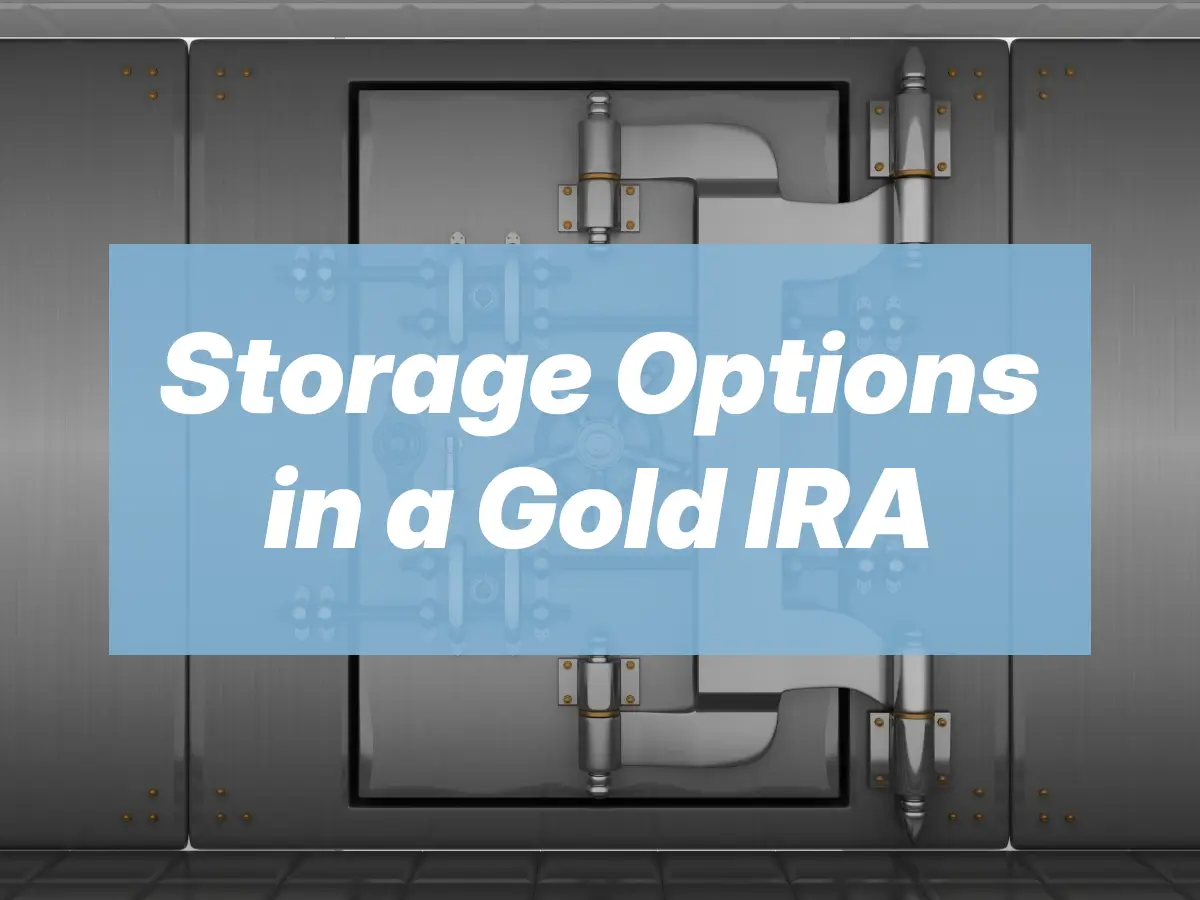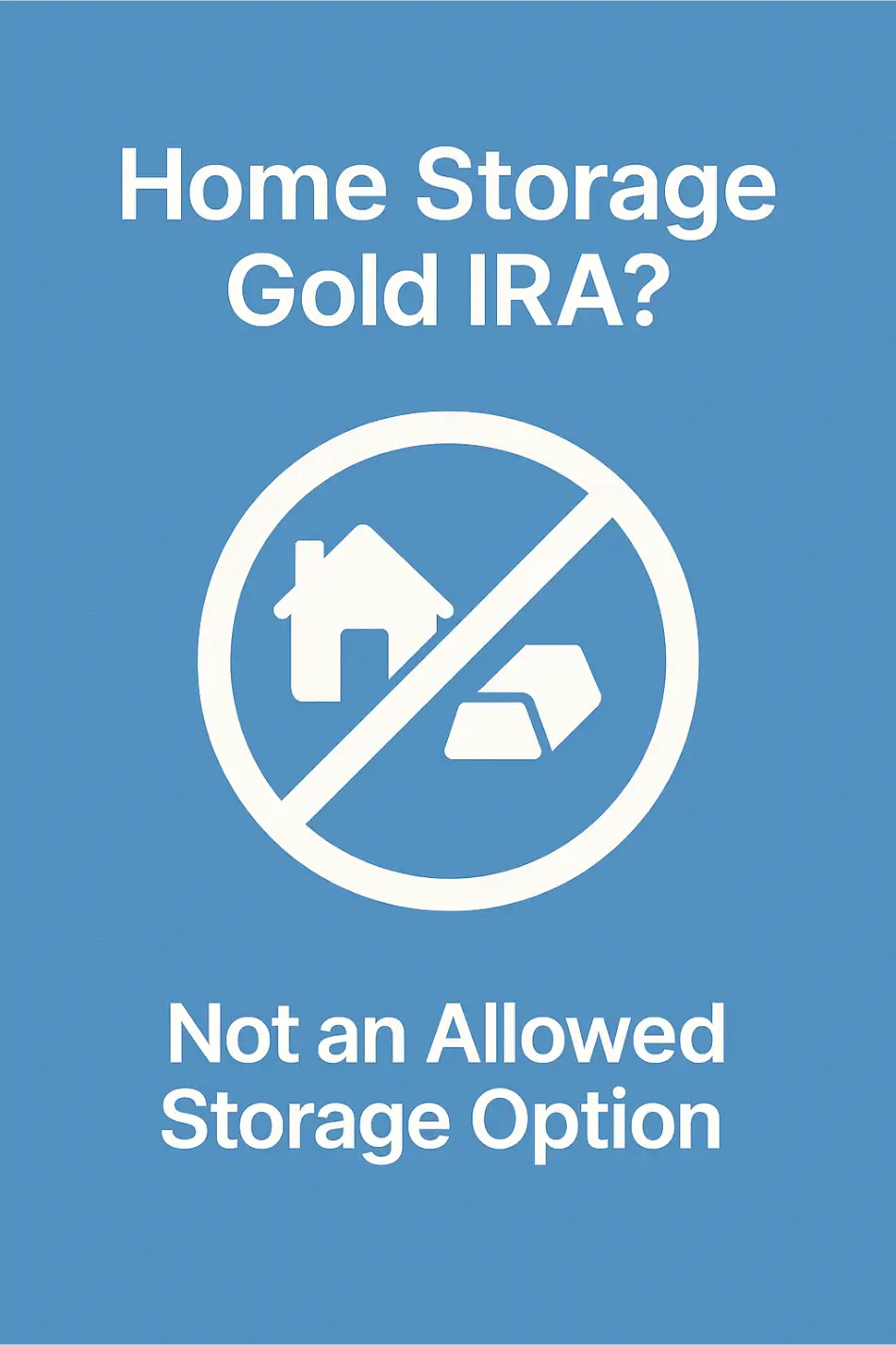Storing Your Gold IRA: Is At-Home Storage Possible?
Storing physical gold in a Gold IRA is more than just choosing a vault. How and where your metals are stored comes with certain requirements. Many investors ask if home storage is allowed in a Gold IRA, but strict rules apply in storing precious metals in a retirement account. Before opening a Gold IRA, first plan for what's legally allowed, how storage works, and the risks behind misleading "home storage" promotions.


Can You Store IRA Gold at Home?
No, you cannot store gold from a Gold IRA at home. IRS rules under IRS code 26 U.S.C. § 408 require that all IRA-owned precious metals be held in an IRS-approved depository under the custody of an approved IRA custodian.
No physical possession of the metals at your residence or in a personal safe is permitted. A home storage Gold IRA could result in taxes and penalties and is a misleading term used in promotions, and is not an IRS-approved strategy. Storage options for gold and other metals only includes a depository that's permitted by the IRS, a self storage Gold IRA does not qualify the investment.
What Happens If You Store IRA Gold at Home?
If you store IRA-owned gold at home or in any location not approved by the Internal Revenue Service, the IRS may treat the gold as a distributed asset. This means the entire value of your metals is considered taxable income in the year the violation occurs. In addition to income taxes, a 10% early withdrawal penalty may apply if you're under age 59½ due to a home storage IRA.
Consequences of Home Storage Gold IRAs:
- Loss of IRA tax benefits.
- Reclassification of your account.
- Full metal value treated as taxable income.
- 10% early withdrawal penalty if under age 59½.
- Potential interest or back taxes owed.
- Disqualification of your self-directed IRA.
Follow all regulations in a Gold IRA by storing your IRA precious metals in an IRS-approved depository through a verified custodian. We explain how this process works in detail below to better outline how the storage of Gold IRAs works.
"Trustee Corporation" Storage in Gold IRAs & Why It's Risky
You may see some promoters claim that you can legally store Gold IRA metals at home by creating a specific type of entity, often called a "checkbook IRA" or "trustee corporation." This involves forming an LLC to act as the IRA's trustee and holding the metals under your direct control. This strategy carries serious compliance risks and has been challenged by the IRS.
To establish a home Gold IRA (not IRS-compliant), you'd need to:
- Create an LLC in your name with multiple owners.
- Maintain at least $250,000 in qualifying assets.
- Obtain a $250,000 fidelity bond for all trustees or employees.
- Operate from a public business location.
- Demonstrate financial expertise and fiduciary experience.
- Undergo annual audits and retain legal counsel.
Even if all conditions are met, the IRS has not formally approved this structure. In PLR 200217059, the IRS ruled that transferring IRA-owned bullion to a non-bank entity for safekeeping constituted a distribution. More recently, in McNulty v. Commissioner (2021), the Tax Court found that a couple who stored IRA-purchased gold coins at home had taken constructive receipt of the assets which resulted in a taxable distribution.
For most investors, the safer and IRS-compliant option is to establish a Gold IRA through a licensed custodian and store metals in an approved depository.
How Gold IRA Storage Works
Gold held in a self-directed IRA is stored in an IRS-approved depository through a qualified custodian. After your Gold IRA company completes the rollover of funds and purchase of IRA-approved gold coins and other gold assets, those metals are shipped directly to the vault storage facility through the custodian.
These vaults are secure, fully insured, and report holdings on behalf of your IRA. You won't physically handle the metals while they remain inside the Precious Metals IRA. The custodian maintains legal control while gold storage remains in the IRA.
Storage With an IRS-Approved Depository
An IRS-approved depository is a secure storage facility authorized to hold IRA-owned precious metals on behalf of a qualified custodian. These depositories must meet strict standards for security, insurance, and asset segregation, and are regularly audited.
Once your gold is purchased for the Gold IRA, it's stored in your name or account ID at one of these vaults with yearly Gold IRA storage fees. There are primarily four IRS-approved facilities you will see your precious metals held in.
Popular IRS-Approved Gold IRA Depositories:
- Delaware Depository (Wilmington, DE)
- Texas Precious Metals Depository (Shiner, TX)
- International Depository Services (IDS) Group (Locations in Delaware, Texas, and Ontario, Canada)
- Brink's Global Services USA, Inc. (Multiple depository locations across the U.S.)
- CNT Depository (Not as common)
- A-M Global Logistics (AMGL) (Not as common)
These depositories carry all-risk insurance policies, underwritten by Lloyd's of London, covering loss, theft, in-transit damage, fire, natural disasters, and mysterious disappearance. Per-account coverage typically ranges from $50 million to $200 million, while total vault-level insurance can extend up to $1 billion. Some depositories allow scheduled in-person visits by appointment.
Segregated vs. Non-Segregated Storage
When storing precious metals in your Gold IRA, segregated storage is when your metals are stored separately from others, in a dedicated & labeled account. Metals in segregated storage have serial number tracking for accurate reporting. Non-segregated storage (Also called commingled or pooled) holds your metals alongside others of the same type/purity, ownership is still recorded.
Segregated storage offers an added layer of transparency and physical separation at a higher cost storage option. Non-segregated storage is what you'll commonly see due to its lower fees. Both options are secure and fully insured so it really comes down to retirement investment goals which you can plan with your financial advisor.
| Segregated Storage | Non-Segregated Storage | |
|---|---|---|
| Asset Control | Specific bars or coins allocated to your IRA only. | Pooled metals where you hold a proportional share. |
| Identification | Metals labeled and tracked by serial number. | Tracked by weight and type, not uniquely tagged. |
| Storage Fees | Higher costs due to individualized handling and vaulting. | Lower costs due to shared handling and space. |
| Security Level | Enhanced: Physically separated from others. | Standard: Stored in bulk with others. |
| Best For | Investors prioritizing traceability. | Cost-focused. |
Can I Choose My Own Storage Facility?
You cannot choose any Gold IRA storage facility on your own. Your Gold IRA custodian must arrange storage with an IRS-approved depository. You may be offered a choice between a few approved locations by your Gold IRA company, but it must go through the custodian. Offshore storage of a Gold IRA is not allowed.
Alternatives to a Home Storage Gold IRA
If storing gold at home is still a priority, a Gold IRA may not be the right fit for you due to IRS restrictions. Instead, you can purchase physical gold directly from a precious metals dealer outside of a retirement account.
This allows you to store it in a home safe, safe deposit box, or a private vault. You'll lose the tax advantages of an IRA, but you'll have full control over how your metals are stored. If you still want the retirement benefits, combining a Gold IRA with a separate physical gold purchase can offer diversification into both methods.
